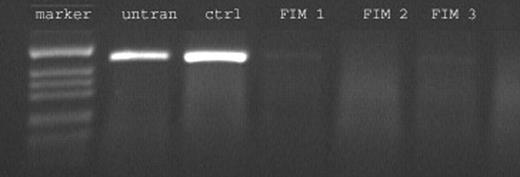Abstract
Development of targeted therapies against B-CLL is dependent on the identification of molecules that are essential for the proliferation and survival of the leukemic cells. One such molecule investigated by us as a putative leukemia-associated target is Fibromodulin (FIM). FIM is an extracellular matrix molecule belonging to the leucin-rich proteoglycan family. Our laboratory studies have verified that expression of FIM is upregulated in B-CLL cells. Moreover, this molecule is specifically overexpressed in B-CLL cells and not on normal peripheral blood mononuclear cells. Analysis of FIM expression on various other hematological tumor cells have revealed that with the exception of mantle cell lymphoma, FIM is not expressed in other hematological malignancies.
RNAi technology has recently emerged as a powerful method to specifically silence the expression of a gene. We have generated three siRNA against various segments of FIM and tested the effects of these siRNA on B-CLL cells. Transfection of B-CLL cells with these siRNA significantly diminished, or completely abrogated the expression of FIM mRNA as detected by RT-PCR. The figure below shows silencing of the FIM gene following siRNA transfection, as assayed by RT-PCR. “Untrans” and “ctrl” represents untransfected and control siRNA-transfected B-CLL cells respectively. As noted, transfection with each of the three siRNA against FIM completely abrogated the expression of FIM siRNA. 24–48 hours after siRNA transfection, a substantial fraction (30–70%) of the B-CLL cells, compared to cells transfected with control non-silencing siRNA, went into apoptosis as assayed by Annexin-V-propidium iodide staining. Time kinetic studies revealed that siRNA mediated silencing and apoptosis occurred between 18 and 48 hours. No such effect was noted when peripheral blood mononuclear cells of healthy donors or FIM-positive fibroblast cell lines were transfected with siRNA. In reconstitution experiments, siRNA treated B-CLL cells were co-cultured with various numbers of FIM-positive fibroblasts. The presence of these fibroblasts greatly diminished the apoptosis of B-CLL cells induced after siRNA treatment. Our results indicate that overexpression of FIM in B-CLL cells are critical for their survival and FIM may serve as a leukemia-specific target for B-CLL therapy.
Author notes
Corresponding author


This feature is available to Subscribers Only
Sign In or Create an Account Close Modal